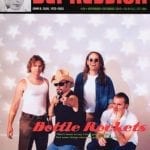Warren Zevon: 1947 to 2003
Warren Zevon was a big fan of Doctor Faustus; he thought the Thomas Mann tome was “the ultimate rock ‘n’ roll novel.” But if he himself cooked up any deals with the baddest of Mr. Bad Examples, he got sold short.
Fame? He had his share of it, even before he gave that unprecedented command performance for David Letterman earlier this year. But it wasn’t like he ever got big like Creed or J. Lo. And as for r-e-s-p-e-c-t, the New Yorker didn’t get after him for a profile until he had one foot and three toes in the grave. “Too late,” he responded to the request, blowing one last good kiss-off, indifferent to the hype value the magazine’s two cents would have had for his painfully completed final album, The Wind.
Out in Los Angeles, a lifetime removed from his native Chicago, Zevon probably had to take a number to shake hands with the devil. You can picture him trading shots with his Evil Dudeness at Trader Vic’s, his hair of course less than perfect. Whatever the setup, he became a marked man out west, a Jewish Jesse James gunning down self-satisfaction among the peaceful, easy-feeling set while waiting for his crimes of excess to catch up with him. (Just as David Cronenberg rescued Jewish intellectualism from Woody Allen’s increasingly cute clutches with his Kafkaisms, Zevon rescued singing and songwriting from the dreaded me-my-mine-ness of the confessional set with his zestily imagined pulp narratives.)
His first shots heard round the rock world were ear-openers. Those who had never heard him until they heard “Johnny Strikes Up The Band”, the opening track on his classic 1978 album Excitable Boy, actually had an advantage over those who knew him from earlier craftsmanlike efforts. Here was one of the all-time great announcements of things to come, a song that in mixing ascending spirits and grave intent came across like fine wine served with karate kicks. “Dry your eyes,” indeed. And then came “Roland” — oh, yes, play that dead man’s dead man’s song. And the endlessly requested “Werewolves”. And the stomping “Lawyers, Guns And Money”, which hit his fans with some of his meanest shit.
Zevon had plenty of stellar moments in subsequent years — am I the only one who dug that forgotten live album with the untempered bar band? But when you set his kind of wicked standard, and put your name to it — Zevonesque — you can’t help falling to a bit of the old self-consciousness. “This one just isn’t funny, dear,” he said his mother told him in dismissing his 1989 album Transverse City. Falling off stages and the wagon exacted a greater price. The boozy writer myth failed him.
Its swinging-door cast of superstar sidemen notwithstanding, The Wind (released a few days before his death September 7 from lung cancer at age 56) doesn’t knock on heaven’s door so much as render a respectful tap-tap-tap. But whatever its limitations, it bears powerful testament to Zevon’s dedication to his art, and the profound way it defined him and his generation.
Zevon once said that pouring violence into his words and music was his way of coping with his fear of death, a fear that no amount of open mockery could lessen — until the end came, as scheduled, and he shook his Faustian fate to affirm life. “Let’s party for the rest of the night,” he sang. Amen.




